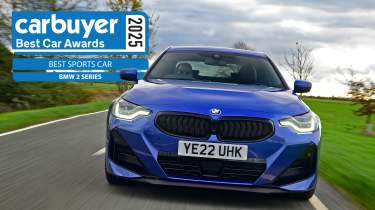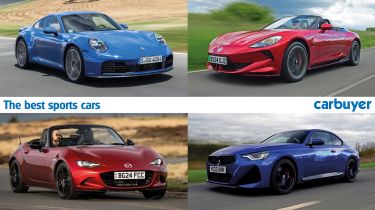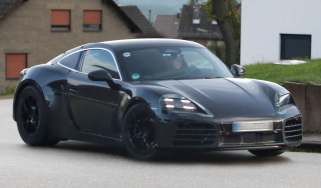BMW 2 Series Coupe review


Sports cars are rarely the most rational choice when it comes to buying a new car. They’re often more expensive and less fuel-efficient than their more sensible counterparts, and not always the most practical for everyday use.
But for many drivers, the sheer joy of driving a proper sports car more than makes up for these compromises. Few experiences can match the thrill of a lightweight coupe or roadster tackling a twisty B-road, with sharp steering, a responsive engine, and an exhaust note that puts a smile on your face.
That said, not all sports cars require you to completely sacrifice usability. Some are surprisingly practical, offering decent boot space, comfortable interiors, and the latest tech to make daily driving more convenient. For most buyers, we think these sports cars are the best middle-ground between performance and practicality, because what good’s a sports car if you can’t even use it?
Whether you want something small and nimble like the Mazda MX-5, or a low–slung coupe with supercar-rivalling performance, there’s a sports car for you. We’ve rounded up the best on sale in the UK today, covering a range of price points. So, if you're looking for a car that will make every journey feel special, read on to find the perfect sports car for you.
If feeling the wind in your hair is essential for your sports car experience, you may want to read our list of the best convertible cars, as not every model on this list has a folding roof. If that’s not a concern for you, take a look at the 10 cars below…
The latest BMW 2 Series impressed us so much that it won the best sports car category at the Carbuyer Best Car Awards 2025. It’s a sports car that you can happily use every day, thanks to its large boot, high-quality interior and the same planted driving experience you get in the larger 3 Series and 4 Series. We think it strikes the best balance between sportiness and practicality, making it the sports car of choice for most buyers.
Like most traditional sports cars, the 2 Series is rear-wheel drive, unless you go for the flagship M240i xDrive which gets all-wheel drive for additional grip. The entry-level model’s 181bhp 2.0-litre petrol engine offers a decent amount of punch and will satisfy most buyers, plus it comes as standard with an eight-speed automatic gearbox. The M240i is far quicker thanks to its 369bhp 3.0-litre six-cylinder engine, which can propel it from 0-62mph in just 4.3 seconds. We think the 230i with 242bhp offers a happy middle ground.
Inside, the interior of the 2 Series Coupe is very similar to BMW’s more expensive models, which is no bad thing. It boasts a driver-focused layout, high quality materials, and top-notch technology including a curved digital dashboard running BMW’s slick iDrive infotainment system. Practicality is also respectable, with enough room in the back for two children and a 390-litre boot.
| Pros | Cons |
|
|
Find new and used deals for the BMW 2 Series on our sister site Auto Express
The definition of a sports car has been stretched to cover all types of vehicles, but the Mazda MX-5 has one of the strongest claims to the term of all. Originally built to be a reliable and fun transport to compete with the sports cars of three decades ago, the Mazda MX-5 has stood the test of time. The latest generation of the MX-5 may have been on sale for a while now, but it continues to be the default choice for those wanting a sports car under £30k.
The 1.5-litre and 2.0-litre engines available produce 130 and 181bhp respectively, and while these are small numbers relative to most other modern performance cars, the MX-5 never feels underpowered. Agile, quick and great value for money, the MX-5 is fun at even modest speeds, rather than a car that needs to be driven at licence-losing pace before you get anywhere near its limits.
| Pros | Cons |
|
|
Find new and used deals for the Mazda MX-5 on our sister site Auto Express
Porsche is renowned for building sports cars that combine a fun driving experience with everyday driving ability, making them equally enjoyable to drive to the supermarket or on a race track. The 718 Cayman sticks to this tried-and-tested formula, following on from the success of the convertible Boxster and has since become the entry-level vehicle of the Porsche sports car range. Base models are powered by a slightly lacklustre 2.0-litre engine, but the desirable GTS variant gets a larger six-cylinder engine for more horsepower and a sonorous engine note.
As a bonus, the Cayman is also available with a super-slick six-speed manual gearbox that maximises driver involvement, or a seven-speed automatic that marginally improves performance. Talking of which, with three engines offering between 296 and 395bhp, 0-62mph acceleration times range from 5.1 to 4.2 seconds with optional launch control. All of which can be enjoyed from a beautifully designed interior, for a truly premium sports-car experience. If you want an even more focused Cayman, you’ll need to try and get your hands on the GT4 model, while the whole line-up is also available in convertible form with the Porsche Boxster.
| Pros | Cons |
|
|
Find new and used deals for the Porsche 718 Cayman on our sister site Auto Express
We’ve already listed the standard BMW 2 Series here, but the full-fat high-performance M2 coupe is worthy of its own place given it’s a completely different experience in its own right. The M2 has a more focused mission to accomplish – to deliver the last word in driving thrills and performance, and deliver it certainly does. In fact, despite being the cheapest M car you can buy, the M2 is so good that we rate it more highly than its big brother, the M4.
To put it bluntly, it’s more fun than the M4, with its more compact size paying dividends on our twisty UK roads. Potentially the last BMW M car to be powered by a non-electrified combustion engine, the M2 gets a 3.0-litre turbocharged six-cylinder engine with 473bhp, paired with an automatic gearbox as standard – keen drivers will be pleased to know it can also be specified with a manual gearbox for an extra fee. We rate the 2 Series even more highly, because it provides enough fun for most people at a much lower price point than the M2. But the M2 will appeal to buyers looking to dial up that experience even further, and for whom the standard 2 Series isn’t quite enough, no matter the cost to buy and run.
| Pros | Cons |
|
|
Find new and used deals for the BMW M2 on our sister site Auto Express
For many, the Porsche 911 is the quintessential sports car. It has long offered the ultimate blend of supercar-rivalling speed and four-seater practicality, even if the two rear seats are best suited for children. It’s grown in both size and price over the years – you now need six figures to get behind the wheel – which has allowed the smaller, cheaper 718 Cayman to excel. But as good as that car is, the 911 still appeals to those wanting the best in performance, precision and quality from their German sports car.
Even in its most basic Carrera trim level, the Porsche 911 is mightily fast. The latest ‘992.2’ model puts out 389bhp from its turbocharged flat-six engine, and its 3.9-second 0-62mph feels more than quick enough. Stepping up to GTS, GT3 or Turbo models pushes the 911 firmly into supercar territory – with a supercar-worthy price tag – so these models are reserved for the serious enthusiast. All in, the 911 feels just as relevant as it did back in 1964 and you’ll struggle to find a better sports car experience – as long as you can afford it.
| Pros | Cons |
|
|
Find new and used deals for the Porsche 911 on our sister site Auto Express
As carmakers ramp up EV and hybrid production to hit climate targets, there are very few cars left in the UK with an old-school V8 engine. One such car is the Ford Mustang, the iconic American ‘pony car’ that pairs classic coupe looks with a hot-rod soundtrack. After 60 years in production, the latest Mustang is as good to drive as it looks and makes for a seriously fun sports car.
You can buy the car in standard 'GT' spec with a 440bhp 5.0-litre V8, or in Dark Horse trim, which marginally boosts power to 447bhp, but gets a host of chassis upgrades. The GT will be the one to pick for most buyers, as it’s cheaper to buy and just as much fun to wind along a B-road. On paper, the Mustang’s 5.4-second 0-62mph time (5 seconds for the auto��) isn’t anything special in a world of lightning quick EVs, but the theatrical engine is the real star of the show. That said, the sophisticated suspension setup means the Mustang stays much flatter through corners than before, and feels a lot more precise on a twisty road. It can’t match the finesse of a Porsche, but if you care more about smiles than lap times, the Mustang is the sports car to put on your driveway.
| Pros | Cons |
|
|
Find new and used deals for the Ford Mustang on our sister site Auto Express
The new Lotus Eletre and Emeya may be stealing headlines at the moment with their 900bhp electric powertrains and 2,500kg kerb weights, but the British brand hasn’t entirely given up on petrol power just yet. The Emira is the last of old-school Lotus, using a mid-mounted engine in a beautiful, two-seater coupe body. Weighing over 1,400kg, it’s a good deal heavier than the old Evora, but thankfully, it’s still a joy to drive.
The base car uses a 2.0-litre four-cylinder engine sourced from Mercedes-AMG with 360bhp, connected to a dual-clutch automatic gearbox. For the true analogue sports car experience, you’ll want the 3.5-litre V6, which comes paired with a six-speed manual. Both are rapid, launching from 0-62mph in just over four seconds, and delivering an impressive level of refinement when you’re not flooring it. That’s an important point to make about the Emira – the step up in quality compared to old Lotus models is vast, making the Emira a far more usable machine and a serious Porsche rival.
| Pros | Cons |
|
|
Find new and used deals for the Lotus Emira on our sister site Auto Express
The Alpine A110 is a sports car in the classic sense; as well as beautiful styling inspired by Alpine models of the 1960s, it sticks to the principles of lightweight and efficiency over brute strength and electronic chassis trickery. Powering the mid-engined Alpine is a 1.8-litre turbo four-cylinder petrol engine that was once used in the old Renault Megane RS – the same Renaultsport team at Dieppe in France actually builds the A110. The A110 weighs just a tonne, so 249bhp accelerates it to 62mph in 4.5 seconds, while economy of around 40mpg makes it surprisingly affordable to run.
With an agile, compliant chassis that’s more comfortable than a Porsche Cayman and almost as grippy, as well as direct responsive steering and an excellent automatic gearbox, the Alpine A110 provides masses of involvement for an enthusiastic driver. The interior ambience is great too, albeit with a little less of the premium feel than in a Porsche Cayman. The fly in the A110’s ointment is limited luggage capacity – with only two 100-litre compartments at either end of the car, camping trips to Le Mans will be compromised.
| Pros | Cons |
|
|
Find new and used deals for the Alpine A110 on our sister site Auto Express
The original MG marque was built off the back of sporty cars such as the Midget, MGA and MGB, but since its rebirth under Chinese SAIC motors, the emphasis has largely been on value-focused family cars. The MG Cyberster changes that, with a return to the two-seater roadster formula, combined with the brand’s cutting-edge EV tech. Yes, this is one of very few fully electric sports cars you can buy today, with a 77kWh battery and a choice of 335bhp or 496bhp motors.
Despite weighing nearly two tonnes, the Cyberster feels just as agile and predictable as a sports car should, with masses of grip even in the wet. However, push too hard and the Cyberster’s suspension and brakes begin to struggle with all that mass moving around. It’s best suited to a more relaxed driving style, preferring to be treated as a grand tourer despite those supercar looks. The looks are certainly worth a mention; few cars this side of £100k look this special, particularly with the ‘scissor’ doors open!
| Pros | Cons |
|
|
Find new and used deals for the MG Cyberster on our sister site Auto Express
If your idea of the perfect sports car involves having the wind in your hair, the BMW Z4 is a great choice. It shares several parts and engines with the Toyota Supra, and is now fitted with a fabric soft-top rather than a metal folding roof. This makes the latest Z4 lighter than the old car, which benefits its handling. Entry-level models are powered by a 2.0-litre four-cylinder petrol engine that produces 194 bhp. Buyers looking for more power can step up to the range-topping Z4 M40i, which is powered by a 335bhp 3.0-litre six-cylinder engine that can manage the 0-62mph sprint in 4.5 seconds.
On the inside, it’s obvious the Z4 is driver-focused as the majority of the controls are tilted towards the driver. All models come as standard with a digital instrument cluster, heated seats and BMW’s iDrive infotainment system. It’s a strict two-seater, but it’s a little more practical than an MX-5, with a 281 litre boot and the option of a thru-loading ski hatch, making it practical enough for a long weekend in the Alps. The Z4 certainly leans closer to the ‘grand tourer’ end of the spectrum rather than ‘hardcore sports car’, but even driving enthusiasts can get excited by the tweaked Z4 ‘Handschalter’, which gets a six-speed manual gearbox.
| Pros | Cons |
|
|
Find new and used deals for the BMW Z4 on our sister site Auto Express
You can compare our top 10 best sports cars in the list below. Alongside their names, you’ll find their starting price and their Carbuyer score.
| Best sport car ranking | Make and model | Priced from | Carbuyer rating (out of 5) |
| 1 | BMW 2 Series | £39,000 | 4.1 |
| 2 | Mazda MX-5 | £28,000 | 4.2 |
| 3 | Porsche 718 Cayman | £54,000 | 4.3 |
| 4 | BMW M2 | £67,000 | 4.2 |
| 5 | Porsche 911 | £100,000 | 4.5 |
| 6 | Ford Mustang | £56,000 | 4.1 |
| 7 | Lotus Emira | £81,000 | 3.6 |
| 8 | Alpine A110 | £54,000 | 3.6 |
| 9 | MG Cyberster | £55,000 | 3.9 |
| 10 | BMW Z4 | £46,000 | 3.9 |
Why not read about the best-looking cars and the best-sounding cars on sale today?



